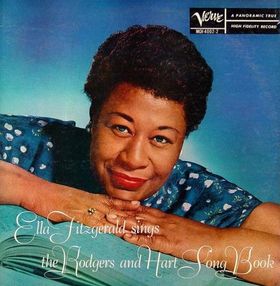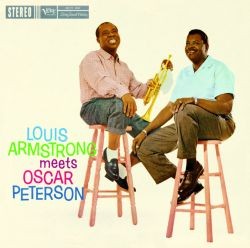
Norman Granz was an American jazz record producer and concert promoter. He founded the record labels Clef, Norgran, Down Home, Verve, and Pablo. Granz was acknowledged as "the most successful impresario in the history of jazz". He was also a champion of racial equality, insisting, for example, on integrating audiences at concerts he promoted.

Ella Jane Fitzgerald was an American jazz singer, sometimes referred to as the "First Lady of Song", "Queen of Jazz", and "Lady Ella". She was noted for her purity of tone, impeccable diction, phrasing, timing, intonation, and a "horn-like" improvisational ability, particularly in her scat singing.

Verve Records is an active American record label owned by Universal Music Group (UMG). Founded in 1956 by Norman Granz, the label is home to the world's largest jazz catalogue, which includes recordings by artists such as Jon Batiste, Diana Krall, Ella Fitzgerald, Nina Simone, Stan Getz, Bill Evans, Billie Holiday, and Oscar Peterson, among others as well as a diverse mix of other recordings that fall outside of jazz including albums from disparate artists like the Velvet Underground, Kurt Vile, Arooj Aftab, Frank Zappa and the Mothers of Invention and many more. It absorbed the catalogues of Granz's earlier label, Clef Records, founded in 1946; Norgran Records, founded in 1953; and material which was previously licensed to Mercury Records.

Mitchell Herbert Ellis was an American jazz guitarist. During the 1950s, he was in a trio with pianist Oscar Peterson.

Porgy and Bess is a studio album by jazz vocalist and trumpeter Louis Armstrong and singer Ella Fitzgerald, released on Verve Records in 1959. The third and final of the pair's albums for the label, it is a suite of selections from the George Gershwin opera Porgy and Bess. Orchestral arrangements are by Russell Garcia, who had previously arranged the 1956 jazz vocal recording The Complete Porgy and Bess.
Porgy and Bess, the opera by George Gershwin, has been recorded by a variety of artists since it was completed in 1935, including renditions by jazz instrumentalists and vocalists, in addition to operatic treatments.

At the Opera House is a 1958 live album by Ella Fitzgerald. The album presents a recording of the 1957 Jazz at the Philharmonic Concerts. This series of live jazz concerts was devised by Fitzgerald's manager Norman Granz; they ran from 1944 to 1983. Featured on this occasion, in 1957, are Fitzgerald and the leading jazz players of the day in an onstage jam session. The first half of the 1990 CD edition includes a performance that was recorded on September 29, 1957, at the Chicago Opera House, whilst the second half highlights the concert recorded on October 7, 1957, at the Shrine Auditorium, in Los Angeles. The original LP obviously included only the mono tracks (#10-18).

Ella Swings Brightly with Nelson is a 1962 studio album by the American jazz singer Ella Fitzgerald, accompanied by an orchestra arranged by Nelson Riddle.

Ella in Rome: The Birthday Concert is a live album by Ella Fitzgerald, with a jazz trio led by Lou Levy, and also featuring the Oscar Peterson trio. Recorded in 1958, it was released thirty years later.

Fitzgerald and Pass...Again is a 1976 studio album by Ella Fitzgerald, accompanied by jazz guitarist Joe Pass, the second of four duet albums they recorded together after Take Love Easy (1973).

Between 1935 and 1955, American singer Ella Fitzgerald was signed to Decca Records. Her early recordings as a featured vocalist were frequently uncredited. Her first credited single was 78 RPM recording "I'll Chase the Blues Away" with the Chick Webb Orchestra. Fitzgerald continued recording with Webb until his death in 1939, after which the group was renamed Ella Fitzgerald and Her Famous Orchestra. With the introduction of 10" and 12" Long-Playing records in the late 1940s, Decca released several original albums of Fitzgerald's music and reissued many of her previous single-only releases. From 1935 to the late 1940s Decca issued Ella Fitzgerald's recordings on 78rpm singles and album collections, in book form, of four singles that included eight tracks. These recordings have been re-issued on a series of 15 compact disc by the French record label Classics Records between 1992 and 2008.

Ella Fitzgerald Sings the Cole Porter Song Book is a 1956 studio double album by American jazz singer Ella Fitzgerald, accompanied by a studio orchestra conducted and arranged by Buddy Bregman, focusing on the songs of Cole Porter.

Ella Fitzgerald Sings the Rodgers and Hart Song Book is a 1956 studio album by the American jazz singer Ella Fitzgerald, with a studio orchestra conducted and arranged by Buddy Bregman, focusing on the songs written by Richard Rodgers and Lorenz Hart.

Ella and Louis Again is a studio album by Ella Fitzgerald and Louis Armstrong, released in 1957 on Verve Records. It is the sequel to their 1956 album, Ella and Louis. In contrast to their previous collaboration, this album features seven solo vocal tracks by either Armstrong or Fitzgerald amongst its dozen duet tracks. It was reissued as part of a two-compact disc set in 1995, and in The Complete Ella Fitzgerald & Louis Armstrong on Verve in 1997. It was recorded at Radio Recorders and Capitol Studios, Hollywood.

Ella and Louis is a studio album by Ella Fitzgerald and Louis Armstrong, accompanied by the Oscar Peterson Quartet, released in October 1956. Having previously collaborated in the late 1940s for the Decca label, this was the first of three albums that Fitzgerald and Armstrong were to record together for Verve Records, later followed by 1957's Ella and Louis Again and 1959's Porgy and Bess.

The Complete Ella Fitzgerald & Louis Armstrong on Verve is a compilation album released on Verve Records in 1997. It comprises three compact discs containing the three studio albums made for the label by Ella Fitzgerald and Louis Armstrong, released during 1956 through 1958.
"It Ain't Necessarily So" is a popular song with music by George Gershwin and lyrics by his brother Ira Gershwin. The song comes from the Gershwins' opera Porgy and Bess (1935) where it is sung by the character Sportin' Life, a drug dealer, who expresses his doubt about several statements in the Bible. The song's melody also functions as a theme for Sportin' Life's character.

Taft Jordan was an American jazz trumpeter.

Louis Armstrong Meets Oscar Peterson is a 1959 studio album by Louis Armstrong, accompanied by Oscar Peterson.
Porgy and Bess is an opera by George Gershwin.


















